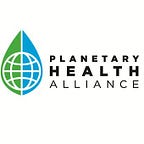International Women’s Day 2022 — A Planetary Health Perspective
Rebecca Sinnott, Kings College London
It is, or should be, an uncontroversial statement to say that Earth is being degraded by human activities. It should also be an uncontroversial statement to say that gender inequality remains globally pervasive, and requires tackling. Unfortunately, there are still those (including some vocal and prominent public figures) who would contest one or both of these statements. This International Women’s Day, the theme is ‘Gender Equality Today for a Sustainable Tomorrow’. In conjunction with this, we want to spotlight the necessity of achieving gender equity to the goals of Planetary Health, and of including women equitably in the work we do to pursue this goal.
There is a long and damning history of progressive movements claiming that gender equity is a secondary priority, something to work towards once the major goal (be it political reform, revolution, or legislative change) is achieved. This fundamentally misunderstands the absolute necessity of gender equity to achieve socio-environmental progress.
In the context of Planetary Health, this is equally true. A recent UN report has concluded that women are globally more vulnerable to the effects of climate change, as (on average) they have less socioeconomic resources, and are more dependent on the natural environment for their livelihoods. From a mental health perspective, women are more likely to report anxiety concerning environmental change. Simultaneously, women are frequently and systematically disempowered in their decision-making capabilities and their mobility. It is completely paradoxical that those most impacted by the degradation of the Earth’s systems should be marginalised from doing something about it. Crucially, the disempowerment of women is intersectional, with race, wealth, nationality, disability, sexuality, and many more facets conditioning the impacts felt by women globally.
As Planetary Health is increasingly prioritised by research bodies, governments, and corporations alike, the vital role of gender equity is gaining traction as well. Media outlets are drawing attention to the role of women in the fight for Planetary Health (such as this BBC special broadcast), and political bodies are taking note, as evidenced by the Women and Climate Change Act recently introduced in the United States Congress, and the special address given at COP26 on Women and Climate Change.
As well as acknowledging the ways that women are marginalised, it is vital to advocate for the essential role they have to play in the Planetary Health movement. Women must be supported to become leaders in the movement, and empowered and educated to equip them with the tools to do this successfully. Launched at the UN Climate Summit in 2019 by Nicole de Paula, Women Leaders for Planetary Health aims to do just this. Through mentorship programmes, educational workshops and resources, and an active and open network of like-minded individuals, WLPH sees gender equity as a necessary keystone, not an addition, to Planetary Health.
Gender equity also means empowering women to meet their evolving needs as the health of the planet rapidly changes. Zenab for Women in Development is a grassroots operation working in rural Sudan with Planetary Health at the heart of its focus. ZWD works across four key themes: Education & Literacy, Livelihoods & Climate Change, Water & Health, and Human Rights & Peace Building. By seeing health, gender equity, and environmental change from a holistic and interdependent perspective, ZWD is able to support rural women farmers to work with, not against, the natural resources, ensuring sustainable sources of income, increasing both their autonomy and sense of community.
The founders of both of these organisations, Nicole de Paula of WLPH and Fatima Ahmed of ZWD, gave fantastic speeches at the launch event for the São Paulo Declaration, which you can find here on our Instagram page. But IWD is not just about setting aside a day to celebrate women’s victories and mourn their losses. It is a yearly reminder that gender equity is an essential and non-negotiable part of the future we are trying to bring into being, in which Planetary Health is at the forefront of the global agenda, and gender equity is at the forefront of Planetary Health. It is only through this that we will achieve meaningful Planetary Health for all, least of all those whose lives and health are most impacted by environmental degradation in the first place.
The São Paulo Declaration on Planetary Health makes the call that “Every person, in every place, from every calling, has a role to play in safeguarding the health of the planet and people for future generations.” Women and girls play important roles in every sector in advancement of this vision — and today we celebrate and honour their dedication.
References
Gruber, Helmut, and Pamela M Graves. Women and Socialism, Socialism and Women : Europe Between the Two World Wars. 1st ed. New York: Berghahn Books, 1998. Print.
https://www.gov.uk/government/speeches/the-role-of-women-in-managing-climate-change
https://www.bbc.co.uk/programmes/p08ydzsf
https://www.congress.gov/bill/117th-congress/house-bill/260/text
https://news.un.org/en/story/2021/11/1105322
https://www.instagram.com/ph_alliance/
https://www.planetaryhealthalliance.org/sao-paulo-declaration
